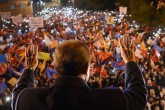The December 17, 2013 operation is the most effective move made by different actors and under different headings against the building of the new Turkey by the Prime Minister Recep Tayyip Erdoğan and the governing Justice and Development Party (AK Party). The more the AK Party’s preferences and moves in national and foreign policies have disturbed many actors inside and outside, the more the ruling party has been exposed to multi-dimensional attacks.
Three consecutive elections to be held in the next year and a half will determine the mindset and figures that will govern Turkey. This explains why political disputes become sharper. The December 17, 2013 operation may be assessed in parallel with the Gezi Park protests that took place six months ago. Although the actors and instruments differ, the political context and targets of these events are similar. The environmentalist concerns involved in the Gezi protests and the corruption allegations involved in the December 17 plot function as nothing other than cover-ups for the political engineering operations.
The December 17, 2013 operation is not only a judicial operation but a political one at the same time. What makes this operation political is that a particular center acting in coordination with the Police and the Judiciary and betraying its institutional obligations and the chain of hierarchy, has reached a capacity to launch a judicial operation and a relevant probe for a certain political purpose. Furthermore, as this operation was discursively supported by Fethullah Gulen, the founder of the Gulen movement, the belief spread around that this secretive center had links to the Gulen Movement.
NO TIME TO BE NAÏVE!
The analyses made without considering these two features of actors behind this operation end up in a position of naiveté on the basis of idealized principles.
Based on normative rightfulness the first case of naivety is to talk of no-fault principles, such as judicial independence, separation of powers, and fight against corruption without considering who the actors are. No doubt that these principles reign supreme in a democratic political system. However, how can analyses of this incident be possible if there is a common belief, or a suspicion, that the prosecutor or the judge as a member of the judicial power has launched an operation in tandem with the priorities of the structure s/he is affiliated with instead of those of the independent and impartial judiciary, and if this suspicion has compelled the Chief State prosecutor to complain to the public about the judicial procedural improperness?
Unless we choose to watch what is going behind a veil of ignorance, what we are faced with is this: there is a cabal inside the State that is able to reach all kinds of secret information by means of strategic positions it holds, in order to browbeat any actors and institutions of strategic worth. This cabal is able then to launch operations by using such information through their influence in the Police and the Judiciary. The entity, again utilizing such information, is able to coerce the alternative power centers, and even by resorting to illegal methods, can elicit personal gains. And ultimately, the entity does not even refrain from bullying to shape, or halt the policies of the elected government according to their own priorities or the priorities of the national and foreign actors with whom it creates alliances.
With such features, this structure has the capacity to dynamite democratic politics and the system more than the past tutelary system could. Without realizing this, seeking shelter in the jargons of independency of the judiciary through normative principles, merely serves to create a shield of legitimacy around this structure. The second naivety in the context of the December 17, 2013 is to talk on a finite ground through no-fault messages of commonsense, such as dissension, brotherhood, and affairs of responsibility. This position ignores the fact that the Gulen Movement h
In this article
- Domestic Policy
- Opinion
- 2013
- Elections
- Fethullah Gülen
- Global Actors | Local Actors
- Gülen Movement
- Istanbul
- May 28-August 20 2013 The Gezi Park Protests
- Prime Minister
- Recep Tayyip Erdoğan
- taksim
- The December 17
- The President of the Republic of Türkiye
- Turkish President
- Türkiye's Justice and Development Party | AK Party (AK Parti)



